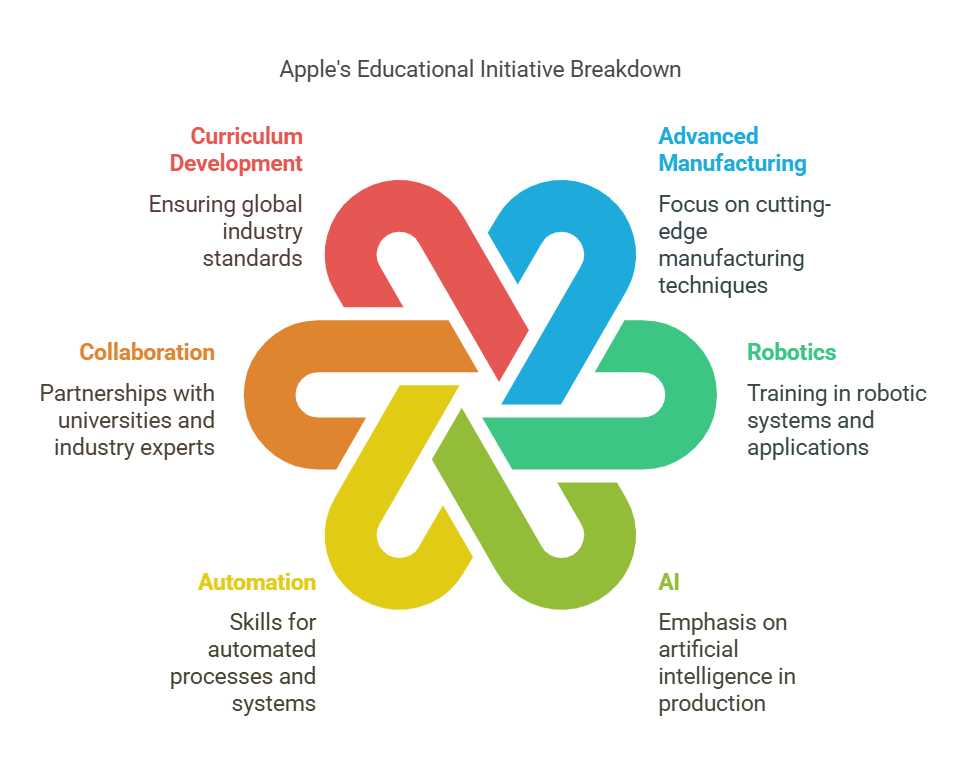Apple has announced a major investment plan worth $500 billion in the United States over the next four years. This move is expected to significantly boost domestic manufacturing, drive innovation, and create 20,000 new jobs across multiple states. The tech giant, known for its iPhones, MacBooks, and cutting-edge technology, unveiled these ambitious plans as part of a broader strategy to expand its footprint in the U.S. and diversify its supply chain.
A New 250,000-Square-Foot Manufacturing Facility in Houston
As part of this investment, Apple will build a massive 250,000-square-foot manufacturing plant in Houston, Texas. The facility, set to open in 2026, will focus on producing high-performance servers that power Apple’s artificial intelligence (AI) services. The move is expected to reinforce Apple’s commitment to advanced computing and AI-driven technologies.
Apple’s decision to establish a large-scale manufacturing unit in Houston is seen as a strategic step toward reducing reliance on overseas production. The plant will be dedicated to assembling and developing servers that will play a crucial role in Apple’s AI infrastructure, ensuring better security, efficiency, and faster processing for AI-powered services and products.
Houston, with its robust industrial infrastructure, skilled workforce, and established technology sector, provides an ideal location for this project. Experts believe that Apple’s investment will boost the local economy, create job opportunities, and contribute to Texas’ growing reputation as a technology hub.
Expanding Data Center Capacity Across Multiple States
In addition to the Houston manufacturing plant, Apple has also announced plans to expand its data center operations across multiple U.S. states, including North Carolina, Iowa, Oregon, Arizona, and Nevada. These expansions will enhance Apple’s cloud computing and AI capabilities, ensuring better performance, data security, and energy-efficient storage solutions.
The company has already been investing heavily in data centers to support its growing cloud services, including iCloud, Apple Music, and AI-powered applications. With the increasing demand for AI-driven services, Apple’s commitment to strengthening its infrastructure aligns with its long-term strategy to compete with tech giants like Google, Amazon, and Microsoft.
Establishing an Educational Academy in Michigan
Apple is also launching an educational initiative in Michigan, where it will set up a dedicated academy focused on advanced manufacturing. This institution aims to train and equip students, professionals, and aspiring engineers with essential skills in manufacturing, robotics, AI, and automation.
With the rapid shift toward automation and AI-driven production, the need for a highly skilled workforce has never been greater. Apple’s academy will not only provide hands-on training and education but will also open doors to employment opportunities within Apple’s expanding U.S. operations. The academy will collaborate with universities, research institutions, and industry experts to ensure that the curriculum meets global industry standards.
Apple’s Largest-Ever Investment Commitment
Apple has described this $500 billion investment as its largest-ever domestic spending commitment. The company previously pledged a $430 billion investment in the U.S. between 2021 and 2026. However, the new plan significantly increases that figure and accelerates Apple’s focus on manufacturing, AI, and innovation within the country.
Apple’s CEO, Tim Cook, emphasized the company’s dedication to fostering American manufacturing, job creation, and technological advancements. In a statement, Cook said:
“From doubling our Advanced Manufacturing Fund to building advanced technology in Texas, we’re thrilled to expand our support for American manufacturing. And we’ll keep working with people and companies across this country to help write an extraordinary new chapter in the history of American innovation.”
This investment aligns with Apple’s long-term vision of expanding its research, development, and production capabilities in the U.S. while reducing dependency on China, where a majority of its products are currently manufactured.
Meeting with President Trump and the Influence of Trade Policies
Apple’s announcement follows a recent meeting between Apple CEO Tim Cook and former U.S. President Donald Trump at the White House. Reports indicate that discussions revolved around Apple’s investment strategy, job creation, and the impact of tariffs on imported goods from China.
During the meeting, Trump acknowledged Apple’s commitment and hinted that the company’s investment was, in part, a response to U.S. trade policies. The Trump administration had previously imposed a 10% tariff on certain imports from China, which significantly affected Apple’s supply chain and production costs. Trump later stated on social media:
“Apple is making this investment due to its faith in what we are doing.”
While Apple did not explicitly confirm whether these plans were developed before or after Trump’s administration, analysts believe that trade tensions and the push for domestic production played a role in shaping Apple’s U.S. investment strategy.
Doubling the Advanced Manufacturing Fund to $10 Billion
As part of this investment, Apple has committed to doubling its Advanced Manufacturing Fund to $10 billion. This fund, first introduced in 2017, is designed to support American manufacturers, innovative production methods, and high-tech industries. The increased funding will accelerate research in AI, semiconductor technology, and energy-efficient manufacturing.
Apple suppliers currently manufacture silicon chips in 24 factories across 12 states. By increasing its investment in domestic suppliers, Apple aims to strengthen the U.S. semiconductor industry, a sector that has seen increased global demand and supply chain challenges in recent years.
Industry Experts Weigh In on Apple’s Strategy
Market analysts and industry experts view Apple’s announcement as a strategic move to diversify its global manufacturing footprint. Dan Ives, an analyst at Wedbush Securities, highlighted Tim Cook’s ability to navigate both corporate and political landscapes. He stated:
“This is a strategic move by Cook & Co. to continue diversifying its manufacturing strategy in both the U.S. and globally while also playing well into Trump’s U.S. investment theme. Cook continues to prove that he is 10% politician and 90% CEO.”
This investment also reflects Apple’s long-term vision of balancing its global supply chain while enhancing domestic capabilities in critical areas such as AI, chip manufacturing, and cloud computing.
Apple’s Commitment to Innovation and the Future of U.S. Manufacturing
Apple’s $500 billion investment is expected to have a far-reaching impact on the U.S. economy, technology sector, and job market. By expanding manufacturing operations, establishing educational programs, and strengthening data center capabilities, Apple is reinforcing its leadership in AI and next-generation computing.
The company’s decision to build a Houston-based AI server manufacturing facility marks a significant step toward reducing its reliance on overseas production, particularly in China. Additionally, Apple’s efforts to invest in education and workforce development demonstrate a forward-thinking approach to preparing the next generation for advanced technology careers.
Apple’s expansion plan is not just a business move; it is a bold statement about the future of American innovation, economic growth, and the role of technology in shaping the next era of digital transformation.



































